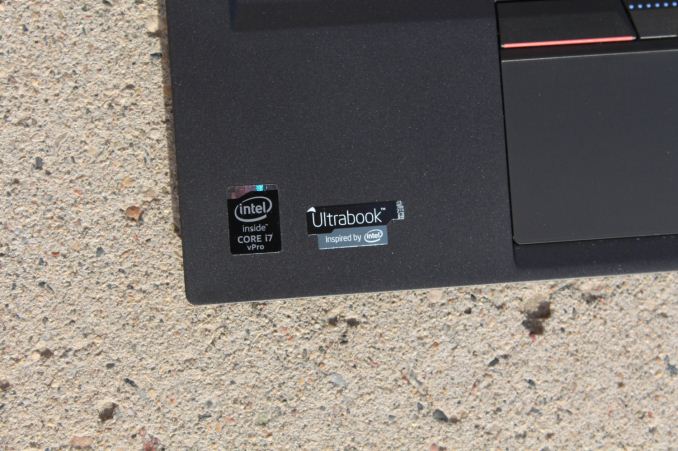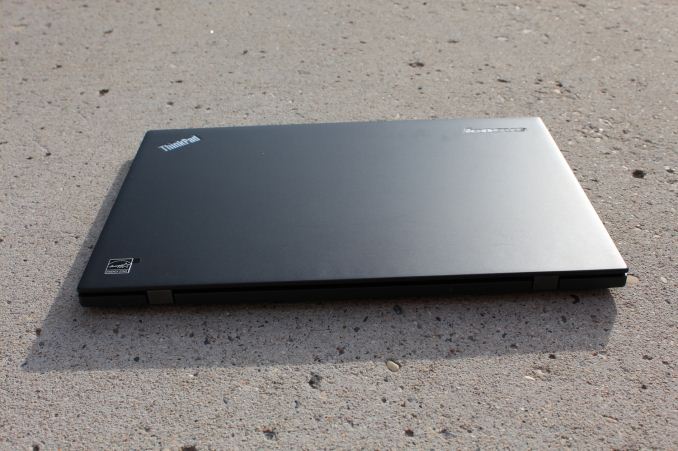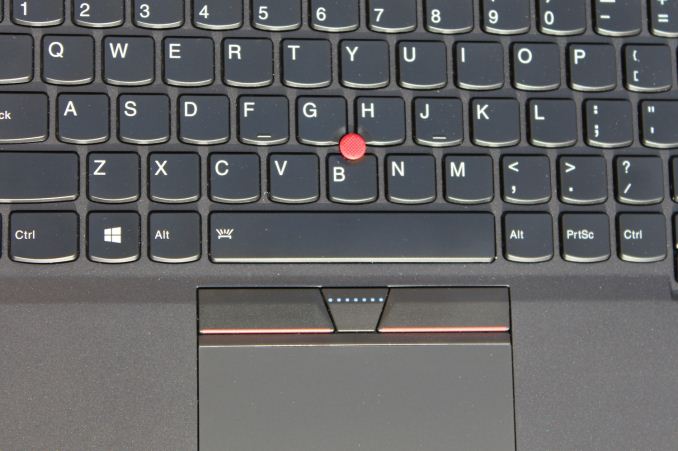The Lenovo ThinkPad X1 Carbon Review (2015)
by Brett Howse on May 21, 2015 8:00 AM EST- Posted in
- Laptops
- Lenovo
- ThinkPad
- Ultrabook
- Broadwell-U
Final Words
The X1 Carbon that Lenovo shipped out for review is likely the fastest Ultrabook yet. The Broadwell Core i7 is certainly a step ahead of the other devices we have tested, and the included PCIe SSD is basically the fastest drive offered today. It is also one of the most expensive Ultrabooks around, with the as-tested price as configured on Lenovo.com at $2100. That is a lot of money for an Ultrabook. The base price is a lot less, but at almost $1100 it is missing some important things like an IPS display and 8 GB of memory. Really the starting configuration is about $1300 once you add those on, and the price can go up again if you opt for more storage.
There is a tremendous amount of competition in the Ultrabook space, so Lenovo needs to differentiate the X1 Carbon and its higher than average price. It does that with the construction to start with. The carbon fibre top is incredibly strong for such a thin display, and the magnesium and aluminum lower half is also very stiff and feels solid. Yet at the same time, the weight of this device is extremely impressive at 2.8 to 3.1 lbs. That is only a hair more than the XPS 13, which has a smaller display and a much smaller body.
The keyboard is also very good on the X1 Carbon, and was likely the most enjoyable keyboard I have had the pleasure of using on an Ultrabook. There are devices out there which are better, but most of them are not this thin, and despite the reduced travel, typing was enjoyable. Lenovo also listened to its customer base and reversed their decision on the function keys, and we see a return of a much more traditional keyboard. I don’t love the Fn and Ctrl keys being reversed as compared to most devices, but it really did not take very long to get used to using it in a new location. For those that can’t adapt, you can go into the BIOS and swap the key functions. The backlighting also was nicely done and has several steps for brightness, and really make it easy to use in a dim setting.
I’m also a big fan of the TrackPoint and I personally find it to be a much more efficient way for me to navigate the GUI. For those that don’t like it, you can disable it (or the trackpad) in the mouse settings and just use the trackpad. Luckily the trackpad is also quite good on the X1 Carbon. There was not any latency that I could detect and it was very accurate with taps, double taps, and scrolling.
The fingerprint reader is also something that I wish was on every notebook. It makes it effortless to log in, and while biometrics may have their detractors, they do allow you to have complex passwords but not have to use them as much, which is going to be more secure than a password like 12345 (which is also the combination of my luggage) and with the Windows Hello initiative coming in Windows 10, there should be a bright future for this kind of login.
Not all is perfect, as with most things. The display is good, but not great. It was great to see Lenovo include an ICC profile but it is too bad that it is not more effective. The display is not overly bright, and the color accuracy is just average. Luckily this was the IPS model though.
The other big detraction was the battery life, which was certainly below expectations. The battery inside is not massive at just 50 Wh, but that means the device needs to be even more efficient, which it is not. Some of that comes down to the X1 Carbon having a physically larger display than most Ultrabooks of course, as well as a higher than average display resolution, but there is likely more to the story. In the end, what matters is the actual battery life, and it could not live up to the lofty results of recent times. At least it charges very quickly, which is a big help.
SIM Slot on the rear of the laptop
A lot of the competition has more USB ports as well, and most have SD card readers built in too. The X1 Carbon has just two USB 3.0 ports and no SD card reader. One partial trade-off is that it does offer a model with LTE connectivity.
Despite the battery life, I really enjoyed using the X1 Carbon. It has an understated look about it which is very traditional ThinkPad, but in a much slimmer design. It is very easy to carry around in a bag, and when you get where you need to go, there is plenty of power on tap to get your work done.














103 Comments
View All Comments
Systemsplanet - Wednesday, November 18, 2015 - link
+1 on HP.-2 Dell
I previously bought Dells until two XPS 18's with flaky USB3 drivers that ran at USB2 speeds no matter what perpheral/cable you used. Dell blamed Microsoft. Who knows. Premium Dell price means it should be integrated. With USB2 or wireless backup the machine was worthless to me. Luckily my wife cracked the display while mopping the floor. Never been so happy.
Bought the HP Zbook 17 last December in a minimal config. Installed a Samsung pcie boot disk xp941 which gets 800/700 MB/ss. Pulled out the DVD and it now hosts a total of 4 1TB SSD drives in a laptop form factor. Love the BIOS. Never had such a problem free experience tricking out a new computer.
Reviewed here on amazon:
http://www.amazon.com/gp/customer-reviews/R20OURYM...
Also, 20Gb/s Thunderbolt 2 rocks for backup and high resolution display on a single bus.
mooninite - Thursday, May 21, 2015 - link
Lenovos are a joke. People associate them with "business" and "reliability" and unfortunately put their dollars in an inappropriate place.The ASUS Zenbook line far exceeds what you get from Lenovo. The current Haswell UX301LAA is a marvelous piece of technology. HiDPI screen. i7. Iris graphics. 8GB ram, 512GB SSD. The new Broadwell version is coming out soon and will blow any other laptop - sans discrete cards - out of the water in every category (cpu, graphics, IO, battery life).
It's time for people to wake up and stop drinking the Lenovo / ThinkPad coolaid. They're not the prized, derived from the Gods, piece of hardware any longer.
alexdi - Thursday, May 21, 2015 - link
This review is missing a conclusion. The basic question is: given everything else out there, would you buy the thing with your own money? If not, what would you buy instead and why? The initial tone of the review is almost an advertisement, but then slides down after the CPU charts. What's your verdict?BGADK - Thursday, May 21, 2015 - link
The X1 was one of the ultrabook PC's for business users I evaluated, but in the end I choose the Fujitsu U904. Lighter, and with better specs, even if it still does not have a Broadwell CPU.I hope Anandtech take a look at the U904, which for me is the best ultrabook in the market.
Laststop311 - Friday, May 22, 2015 - link
if this had the i7-5650u with 6000 graphics and double the eu's at 48 I would of probably bought it. Would of preferred the 1920x1080 screen being ips. If you game at 1920x1080 its going to look better on a native 1920x1080 screen. Also less pixels means larger pixels that let more light through increasing battery life as well as less pixels to process. Also wouldn't mind if they made it a little thicker and heavier and bumped the battery up to 75wh 50% more than the 50wh battery.If only I could have that laptop changed to those specs I'd be a buyer 100%
coder111 - Friday, May 22, 2015 - link
Are they still shipping their computers with malware/spyware rootkits installed?http://en.wikipedia.org/wiki/Superfish
flabber - Friday, May 22, 2015 - link
I have found ThinkPads to be my preferred laptops for two reasons : full maintenance documentation available online, the keyboard/trackpoint.I still have a T41p kicking around, a X61 Tablet and a T61p. Only the T61p had given me a problem with the nVidia graphics adapter. Lenovo had made a recall, but it failed 3 after it had expired.
Great machines - no need to replace my X61 Tablet, so I am sticking with that for now.
Scipio Africanus - Friday, May 22, 2015 - link
HP Elitebook/Zbooks will have the same documentation and also has a pretty good keyboard and trackpoint. Their service has been exemplary as well giving me fast turnaround for a simple loose power connector.seanleeforever - Tuesday, June 9, 2015 - link
ScipioI have yet to find a track pointer implementation that's come close to thinkpads. and I have used 4 elitebook/zbooks including the very last generation of them, and number of dell workstations. my work always has HP/Dell but my personal purchase is always thinkpad just for the track pointer. the fact that you even mentioned "trackpoint" in Zbooks means you don't use the track pointer at all.
truth to be told. I desperately want another manufacture to come up with a decent trackpointer so I can dump thinkpad line.
just2btecky - Friday, May 22, 2015 - link
What OS was this laptop tested on, or can The Lenovo ThinkPad X1 Carbon miraculously run sans OS? Just curious!